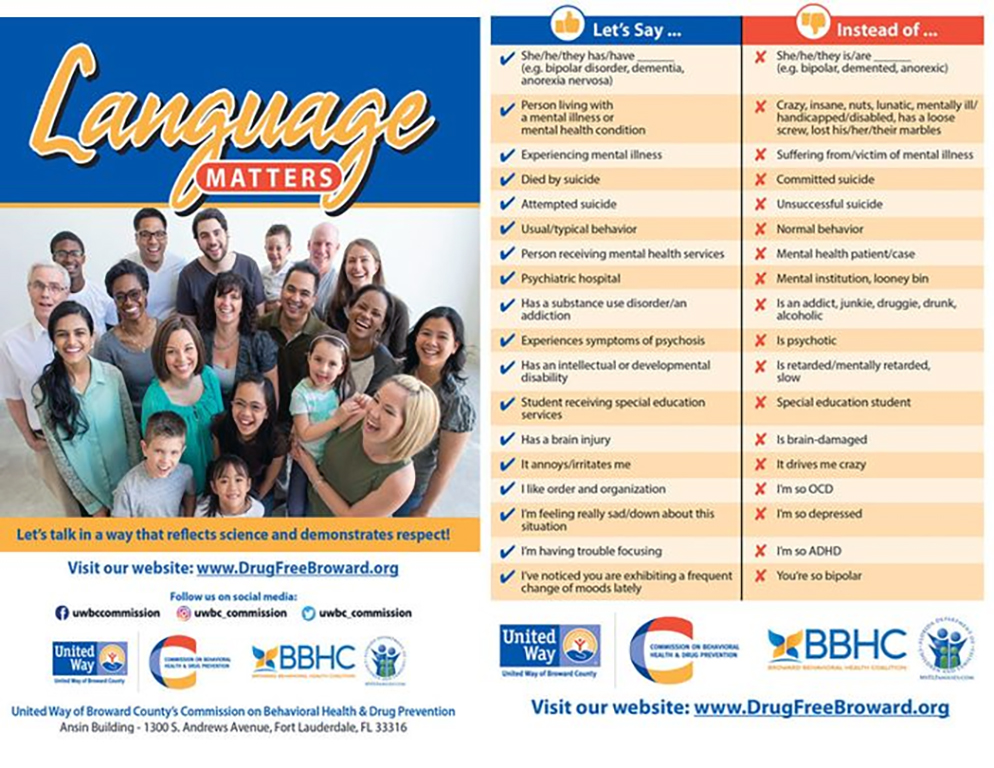LOSS Team
Our Local Outreach to Suicide Survivors (LOSS) Team is made up of trained clinicians
and volunteer survivors of suicide loss that offer meaningful support, resources,
and sources of hope to those that have lost a loved one to suicide.
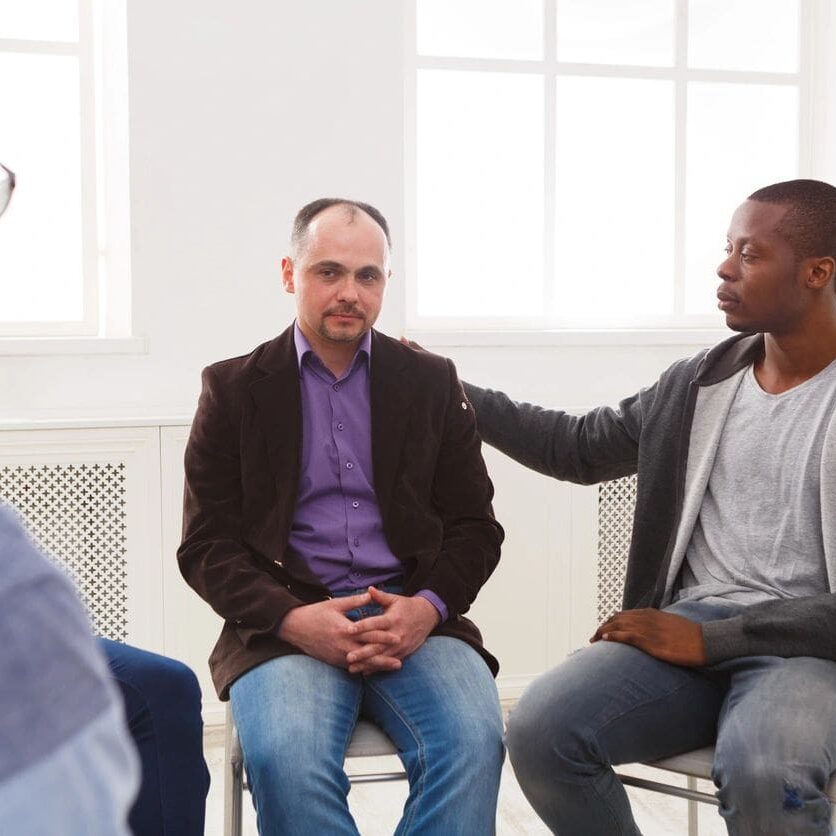
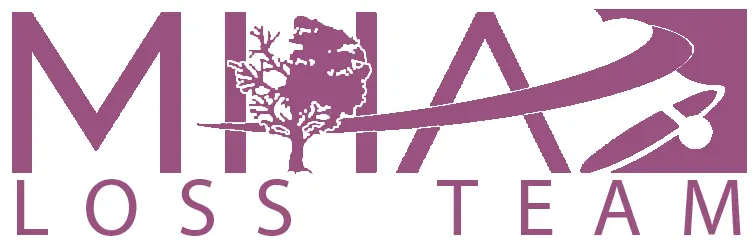
Local Outreach to Suicide Survivors
LOSS Team
Mental Health America of Southeast Florida, in partnership with Florida Initiative for Suicide Prevention, is pleased to announce the creation of Broward County’s first LOSS team. MHA/FISP was awarded a contract from the United Way of Broward County through its funding of Prevention Services by the Broward Behavioral Health Coalition.
Local Outreach to Suicide Survivors (LOSS)’s mission is to immediately offer survivors of suicide, support services designed to help survivors cope with the impact of a loved one’s death by suicide. The LOSS Team is set up to mitigate the aftermath of a death by suicide by offering intervention on a supportive basis. Survivors of death by suicide represent a very high risk of death by suicide based on several factors including grief, guilt, shame and depression. These factors represent a real community health crisis that would be mitigated with the addition of this program.
Family members and other survivors of suicide can ask the difficult questions and expect answers that are straightforward and clearly defined without ambiguity or judgement. By utilizing a clinical director and a peer specialist, the LOSS team connects with families and individuals dealing with tragedy in an empathic and humane way. The LOSS Team is equipped to work with the family and loved ones to help guide them through the process of grief and link them to other services to aid in the aftermath.
As a veteran mental health organization, we know that even the most mundane of tasks seem impossible in the shadow of grief, loss, and trauma. Survivors are given the opportunity to access their aid and ask difficult questions about grief and suicide in a supportive environment. We know these measures will bring a level of solace and healing to a difficult situation, and with our efforts we can hopefully prevent future tragedies.
For more information, please feel free to call:
954.746.2055 X134 or LOSS@mhasefl.org
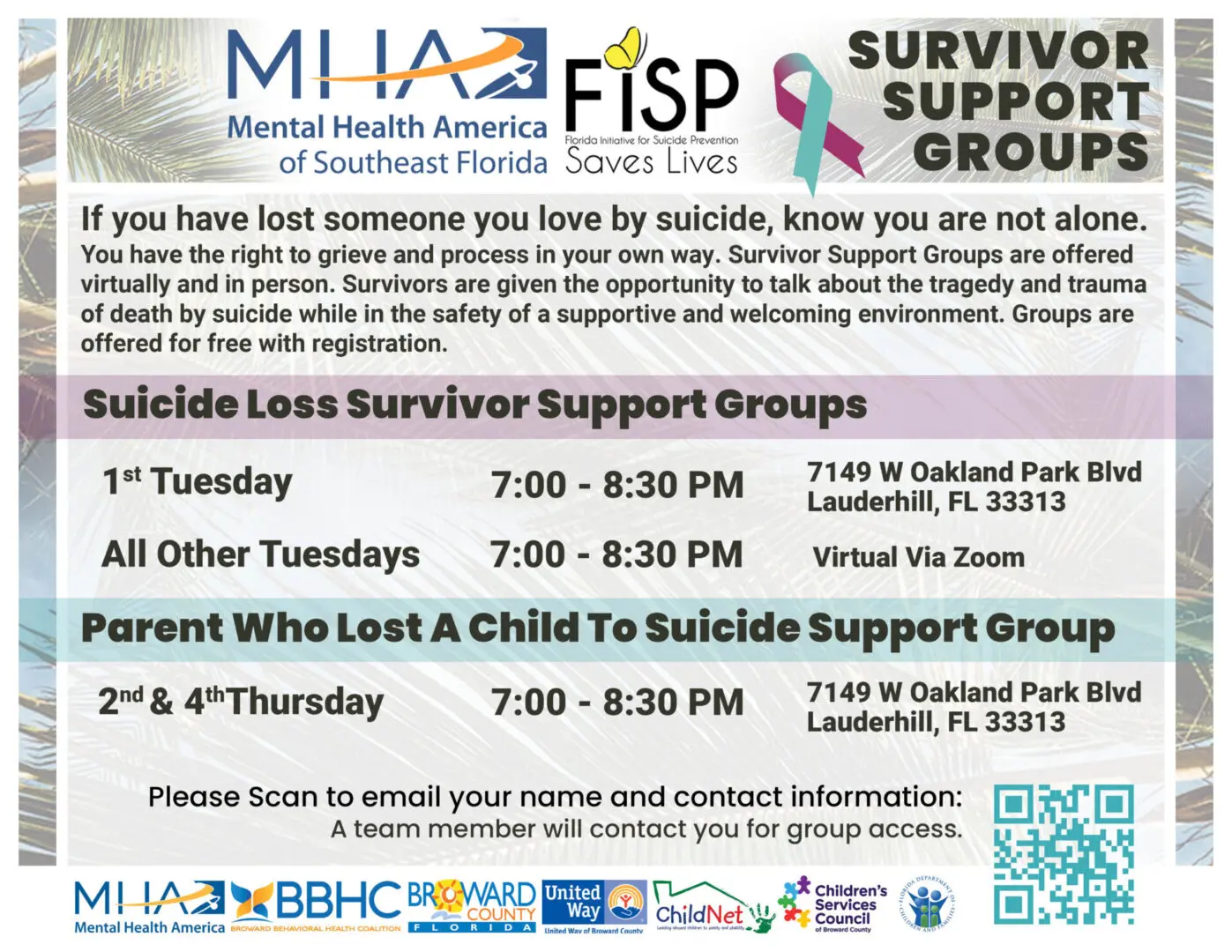
HOPE SUNSHINE CLUBS
Helping Overcome Problems Effectively

H.O.P.E Helping Overcome Problems Effectively
The HOPE Sunshine after school club is approved by the Broward County School Board for an entire school year curriculum engaging middle, high school and college students.
HOPE Sunshine Club members host weekly meetings at each school that has a HOPE Sunshine Club.
The HOPE Sunshine Club Teen Board where each club sends members to meet with other clubs officers to share information and help each other make their clubs better.
Educational Programs:
Suicide Prevention Educational Programs:
The FISP training for Police, EMS, Teachers, Students, Clubs, Community Organizations, and their Staff Members.
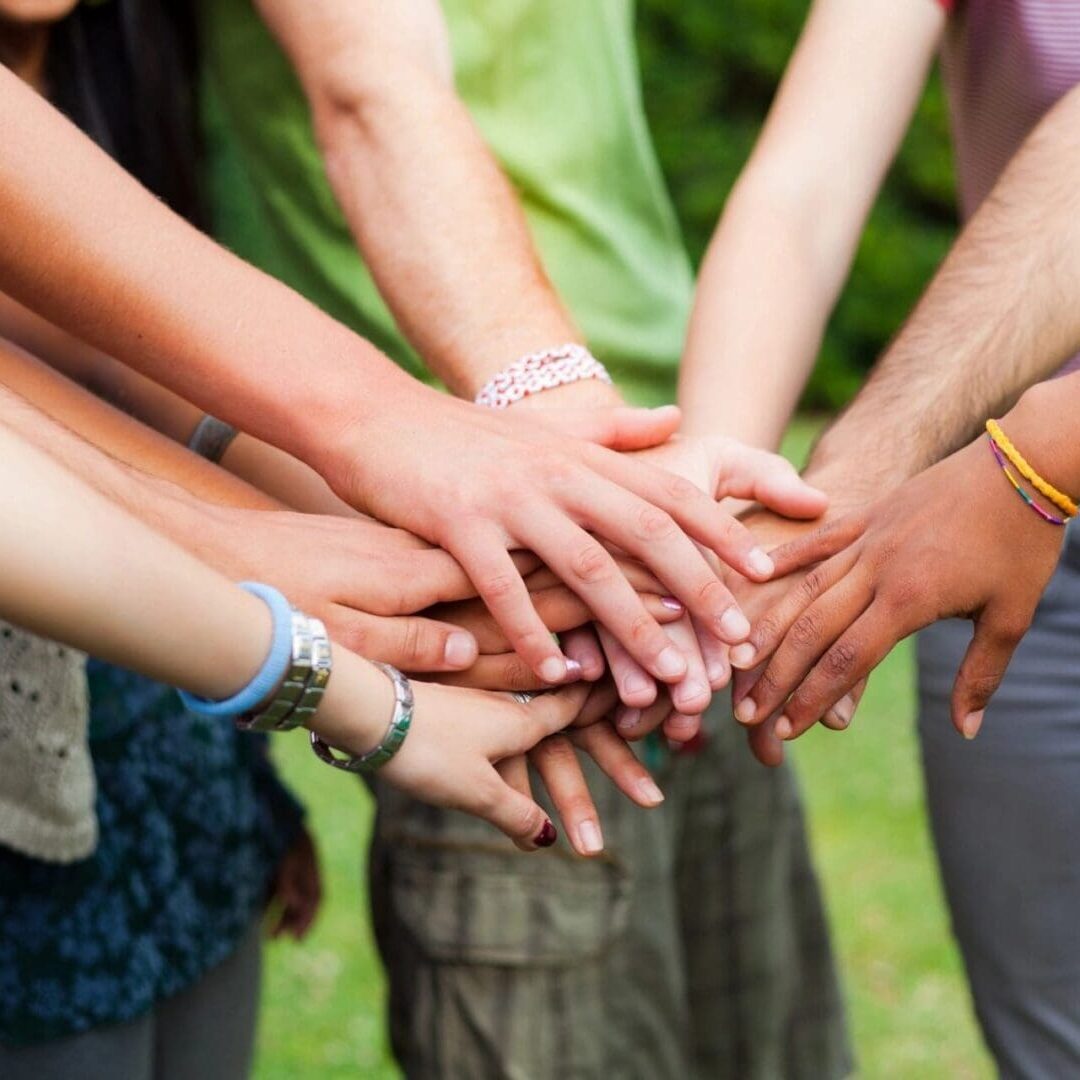
WHY STUDENTS SHOULD JOIN A HOPE SUNSHINE CLUB AS EXPLAINED BY CLUB MEMBERS
“What HOPE does is create a community where people can confide in each other and learn from each other as well. It’s a welcoming environment when the pressures of grades, family, or others can often become overwhelming. It’s also a club that gives opportunities for students to learn and grow by participating in events that expand their knowledge and empathy whilst creating a more understanding community as a whole.” [I.]
The importance of HOPE is to provide students with an open and welcoming environment to allow them to express themselves freely. This safe space is where relationships are built among students, and they can speak openly about anything on their mind or any struggles that they are facing. HOPE educates students about problem solving and how to healthily overcome issues while removing the stigma surrounding mental health. They’re also given the opportunity to help others and the community. HOPE actively spreads positivity.” [C.]
“HOPE gives everyone who feels helpless and alone a sense of family and love. We forget our differences and come together to help each other get through our problems and learn how to solve problems. Hope creates leaders and allows teenagers, and their parents, an opportunity to understand each other and build empathy. Hope gives you a chance to become a better version of yourself and be the change you want to see in the world. HOPE gives hope.” [O.]


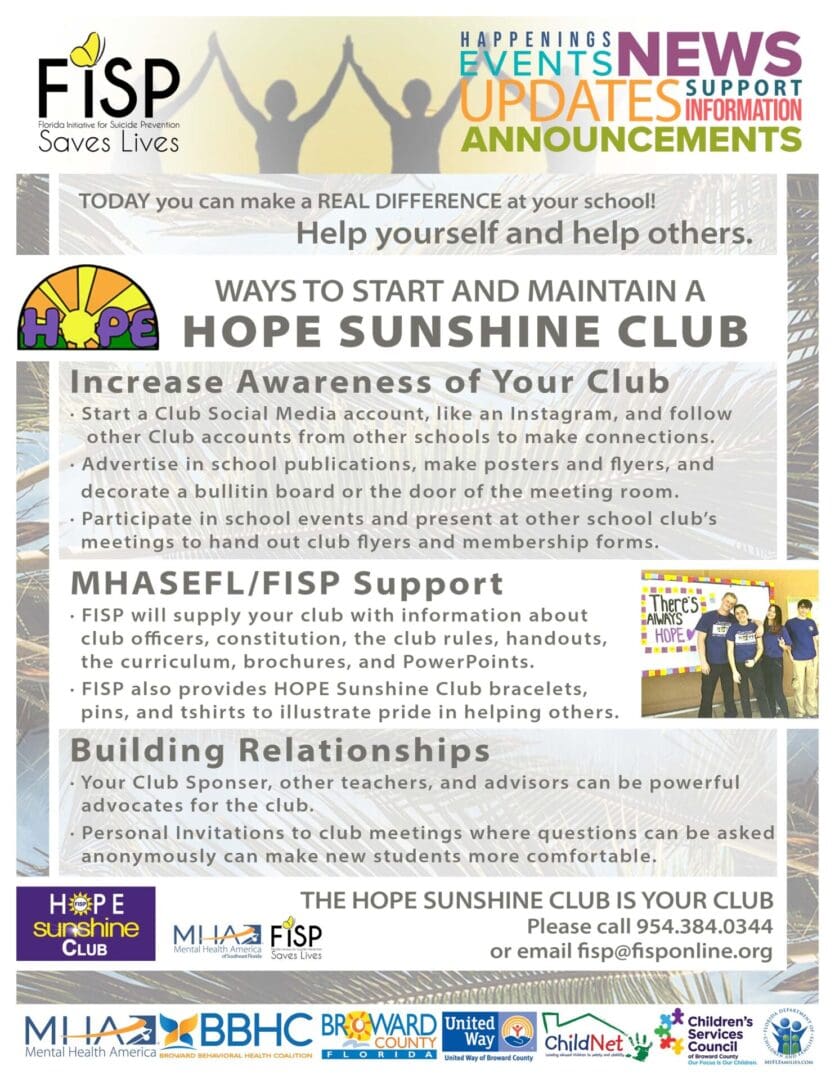
Suicide Prevention

Survivor of Suicide Loss Support
They are mothers, fathers, husbands, wives, partners, grandparents, friends, co-workers and schoolmates. They are children, adults and seniors. They are from every ethnicity, income level, occupation, religion, and location in the world. They are the ones left behind to deal with the pain, sadness, guilt, anger, feelings of helplessness and continually ask the question WHY?
They are you and they are me. They are your neighbors and your best friend. No one is safe from this tragedy. We all know someone who has been affected by this urgent crisis which causes the death of 1 million people annually throughout the world. You may not know that someone who you are best friends with or have another kind of relationship with was affected by suicide because they just don’t talk about it.
If you who have sustained a loss of someone you loved by suicide you need to know YOU ARE NOT ALONE. You have the right to grieve and experience that process in your own personal way. You have the right to be sad, angry, lonely, isolated and feel all the emotions that grief brings. You are not going crazy, you are just grieving! You have the right to do things regarding your loved one in your own time and in the way that has meaning to you. You have the right to grieve for as long as it takes and NOBODY should have to do this all alone.
You can reach out to family, friends, therapists, support groups and of course we at FISP are here for you. Don’t be shocked if those you thought would be there for you have a hard time approaching you and do not know how to help you. Some will run away because they can’t deal with your pain or think you want to be alone. They are not bad people, they just don’t understand how to help you or they have their own issues with loss and/or suicide.
The additional information on this site is to help you find some answers. At some point you will realize that the answer to “WHY” is not what you need to know. Your new emphasis should become the acceptance of the reality that “IT JUST IS” and your need to start working on your grief process. So let’s begin. Give FISP a call and let us help you begin to HEAL!
Educate, Support, Advocate & Help

If you or someone you know is in crisis, please call 911, go to the nearest emergency room, call 1-800-273-TALK (8255) to reach a 24-hour crisis center, or text MHA to 741741 to reach a trained Crisis Counselor 24/7.
You can also call 1-800-985-5990 or text “TalkWithUs” to 66746 at the SAMHSA Disaster Distress Helpline. Trained crisis workers will listen to you and direct you to the resources you need.
Click here for more resources for immediate response.
Recursos para respuesta inmediata
No suicide attempt should be dismissed or treated lightly. We should all learn more about suicide, self-harm, and mental health so that the stigma surrounding the topic is reduced and people aren't afraid of openly talking about their struggles before crisis.
Data from MHAscreening.org
- More than 25,000 depression screeners reported having thoughts of self-harm or suicide on more than half the days of the week. [Source]
- Starting in May 2020, MHAscreening.org saw a dramatic spike in suicidal or self-harm thinking. More than 21,000 people reported this – four times the average numbers from November to January. [Source]
- In June 2020, 25,498 depression screeners reported thinking of suicide or self-harm on more than half of days to nearly every day, with 14,607 reporting these thoughts nearly every day. [Source]
- In July, more than 72,000 of our screeners indicated moderate to severe symptoms of depression, more than 39,000 had moderate to severe systems of anxiety, and more than 19,000 had symptoms of psychosis – the highest numbers we have ever seen. [Source]
- Collectively, since the end of February more than 263,000 people - over and above what we would have expected - have screened moderate to severe for depression or anxiety. This reflects how pervasive mental health conditions are becoming in the general population as a result of the pandemic. [Source]
- In addition to hundreds of thousands experiencing depression or anxiety, more than 42,000 people have also now experienced symptoms related to emerging psychosis. [Source]
- Most worrisome are the 90,000 plus people who report regularly thinking of suicide or self-harm – more than 30,000 in the month of July alone. [Source]
- The July average for suicidal ideation was higher than the May and June averages, as well as the 2019 average for every racial/ethnic group. Native American or American Indian screeners had the highest average percent change over time for suicidal ideation at 1.34 percent, followed by Asian or Pacific Islander screeners at 0.68 percent and Black or African American screeners at 0.53 percent. [Source]
- Since the end of May 2020, nearly every racial/ethnic group has been experiencing consistently higher rates of suicidal ideation than the 2019 average (excluding Native American or American Indian screeners and screeners who identified as another race/ethnicity, who experienced consistently higher rates of suicidal ideation than the 2019 average beginning in July). [Source]
Awareness Campaigns
- World Suicide Prevention Day is September 10
- National Suicide Prevention Week in 2023 is September 10 - September 16
- September is National Suicide Prevention Month
General Information on Suicide and Self-Harm
- Broward Suicide Prevention Coalition Support, Information and Resources
Helping you find your way - General Overview on Suicide
- Self-Injury (Cutting, Self-Harm, Self-Mutilation)
- Recognizing Warning Signs And How To Cope
- Self-Injury and Youth
- Child and Adolescent Suicide
- Helpful vs. Harmful: Ways to Manage Emotions
- 6 Things To Know About Self-Injury
MHA's Screening-to-Supports (S2S) Articles
- Self-Harm Information and Support Hub
- How Do I Stop Cutting?
- My Loved One's Behavior is Scaring Me
- I'm Afraid I'm Going to Kill Myself
- I Want to Die
- I Hate My Body
- Types of Intrusive Thoughts
Webinars
Other Resources


